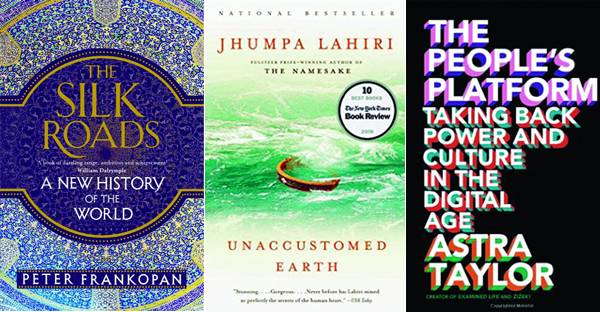
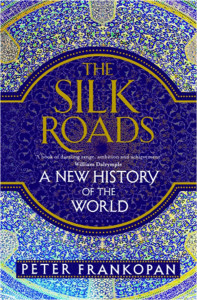
The Silk Roads: A New History of the World
Peter Frankopan
Bloomsbury (paperback), 2015
PRs 1595
It was on the Silk Roads that East and West first encountered each other through trade and conquest, leading to the spread of ideas, cultures and religions. From the rise and fall of empires to the spread of Buddhism and the advent of Christianity and Islam, right up to the great wars of the twentieth century—this book shows how the fate of the West has always been inextricably linked to the East.
Peter Frankopan realigns our understanding of the world, pointing us eastward. He vividly re-creates the emergence of the first cities in Mesopotamia and the birth of empires in Persia, Rome and Constantinople, as well as the depredations by the Mongols, the transmission of the Black Death and the violent struggles over Western imperialism. Throughout the millennia, it was the appetite for foreign goods that brought East and West together, driving economies and the growth of nations.
From the Middle East and its political instability to China and its economic rise, the vast region stretching eastward from the Balkans across the steppe and South Asia has been thrust into the global spotlight in recent years. Frankopan teaches us that to understand what is at stake for the cities and nations built on these intricate trade routes, we must first understand their astounding pasts. Far more than a history of the Silk Roads, this book is truly a revelatory new history of the world, promising to destabilize notions of where we come from and where we are headed next.
Reviews
“This is history on a grand scale, with a sweep and ambition that is rare… A proper historical epic of dazzling range and achievement.” —William Dalrymple, The Guardian
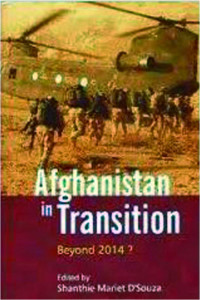
Afghanistan in Transition
Shanthie Mariet D’Souza
Pentagon Press (hardcover), 2012
PRs 1595
Afghanistan is at a cusp of `change`. As 2014, the date for the drawdown of international forces draws near, the international community is confounded by the complexities of an effective inteqal (transition) as by the modalities for ensuring it.
This book brings together varied Afghan voices to set the agenda, address critical gaps in the ongoing inteqal process, 2012-14 and suggest alternate course of action by setting a forward looking agenda, beyond 2014. The strength of this volume stems from the rich contributions by experts and practitioners from the field, providing an in-depth analysis of the perceptions, needs and preparedness on the ground.
The common thread that runs through all the chapters of the book is that inteqal process needs to be Afghan led and Afghan owned. This book provides diverse perspectives of the Afghans by taking a realistic assessment of the achievements and challenges in building local capacities and institutions in key sectors—security, political, governance and economic, for these would form the basis of future progress.
By delving into a range of complex interrelated issues such as security and political sector reform; peace processes-reconciliation, reintegration; economic opportunities- investment, trade and connectivity; civilian surge-aid coordination and effectiveness; strategic communication; role of women, international organisations and non governmental organisations- both from a micro and macro perspective, this volume highlights several critical components of the inteqal process that need immediate and sustained attention. Chapters on regional perspectives and also the US perspective provide important insights into the role of external players in the present imbroglio.
This book is a valuable and timely contribution to the academic and policy discourse on the prospects of effective transition and long-term stabilization of Afghanistan.
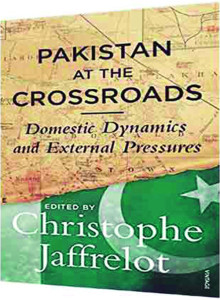
Pakistan at the Crossroads
Edited by Christophe Jaffrelot
Random House India (hardcover), 2016
PRs 1295
Top international scholars assess Pakistan’s politics and economics and the challenges faced by its civil and military regimes. Contributors examine the state’s handling of internal threats, tensions among political parties, police and law enforcement reform, trends in judicial activism, the rise of border conflicts, financial entanglements with foreign powers, and diplomatic relations with India, China, Afghanistan, and the United States.
Reviews
“Pakistan at the Crossroads is a fresh and important contribution to the understanding of Pakistan, a country that for the foreseeable future will remain critical both to the struggle with Islamist extremism and to the geopolitics of Asia.” –Anatol Lieven, Georgetown University Qatar, author of Pakistan: A Hard Country
“Pakistan at the Crossroads provides a diverse collection of articles from a vast array of reputable scholars who have a deep understanding of and knowledge about Pakistan. The contributors imaginatively and incisively venture to explain the disabilities, constraints, and missed opportunities of Pakistani civil and military regimes that could reinvigorate deliberation and dialogue. This multiplicity of views and interpretations and the multidisciplinary content and analysis is the real strength of this multiauthored work.” –Saeed Shafqat, president, Population Association of Pakistan)
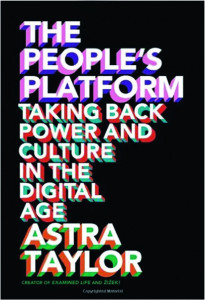
The People’s Platform: Taking Back Power and Culture in the Digital Age
Astra Taylor
HarperCollins (paperback), 2014
PRs 742
The Internet has been hailed as an unprecedented democratizing force, a place where everyone can be heard and all can participate equally. But how true is this claim? In a seminal dismantling of techno-utopian visions, The People’s Platform argues that for all that we “tweet” and “like” and “share,” the Internet in fact reflects and amplifies real-world inequities at least as much as it ameliorates them. Online, just as off-line, attention and influence largely accrue to those who already have plenty of both.
What we have seen so far, Astra Taylor says, has been not a revolution but a rearrangement. Although Silicon Valley tycoons have eclipsed Hollywood moguls, a handful of giants like Amazon, Apple, Google, and Facebook remain the gatekeepers. And the worst habits of the old media model—the pressure to seek easy celebrity, to be quick and sensational above all—have proliferated on the web, where “aggregating” the work of others is the surest way to attract eyeballs and ad revenue. When culture is “free,” creative work has diminishing value and advertising fuels the system. The new order looks suspiciously like the old one.
We can do better, Taylor insists. The online world does offer a unique opportunity, but a democratic culture that supports diverse voices and work of lasting value will not spring up from technology alone. If we want the Internet to truly be a people’s platform, we will have to make it so.
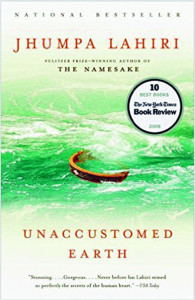
Unaccustomed Earth
Jhumpa Lahir
Random House India (paperback), 2008
PRs 795
Following her thoughtful first novel, The Namesake (2003), which has been made into a meditative film, Lahiri returns to the short story, the form that earned her the Pulitzer Prize for her debut, Interpreter of Maladies (1999). The tight arc of a story is perfect for Lahiri’s keen sense of life’s abrupt and painful changes, and her avid eye for telling details. This collection’s five powerful stories and haunting triptych of tales about the fates of two Bengali families in America map the perplexing hidden forces that pull families asunder and undermine marriages. Unaccustomed Earth, the title story, dramatizes the divide between immigrant parents and their American-raised children, and is the first of several scathing inquiries into the lack of deep-down understanding and trust in a marriage between a Bengali and non-Bengali. An inspired miniaturist, Lahiri creates a lexicon of loaded images. A hole burned in a dressy skirt suggests vulnerability and the need to accept imperfection. Van Eyck’s famous painting, The Arnolfini Marriage, is a template for a tale contrasting marital expectations with the reality of familial relationships. A collapsed balloon is emblematic of failure. A lost bangle is shorthand for disaster. Lahiri’s emotionally and culturally astute short stories (ideal for people with limited time for pleasure reading and a hunger for serious literature) are surprising, aesthetically marvelous, and shaped by a sure and provocative sense of inevitability

